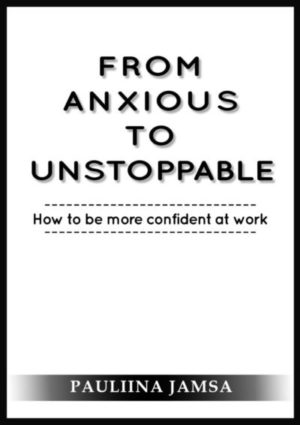So, you’re just going to ignore me?
I didn’t even bother to look up at my colleague and kept typing my report. She didn’t seem to get the hint. How annoying.
No, seriously. What’s wrong??
I sighed, saved the document and closed my laptop. She knew VERY well what was wrong.
For the past few weeks she had been pointing out in meetings and emails everything negative she could find in my project. She also had been escalating and cc:ing the big boss whenever I told her “no” or that she’d need to wait. I was very tired.
Say something!
I got up in silence, took my laptop and left her fuming next to my desk.
That’ll teach her.
It’s annoying, but … are you making the conflict at work worse with your own behaviour?
Ever suddenly realised in the middle of a meeting or a movie that you’ve missed the most of it, because you’ve been thinking about something your colleague said or did?
Exactly.
Conflict at work with a boss or a colleague can cause a lot of anxiety and stress. Instead of us concentrating on the present moment or the task at hand, most of our energy goes into dwelling on the issue.
We feel demotivated, our productivity goes down and it affects our personal life as well.
It’s pretty much all we think and talk about.
It’s easy to play the victim and see the fault in the other party, but very often we tend to over-react and make things worse by the way we’re reacting to it. Suddenly small things start to add up and snowball into a massive conflict.
It’s not good for the company, your colleague and especially YOU.
How to deal with conflict at work:
I’m no stranger to conflicts at work, they form part of everyone’s life. However, whether they affect your mental wellbeing or performance depend fully on your mindset and attitude.
I used to take conflicts very personally and I didn’t deal with them well.
I was the queen of passive aggressivity!!
As part of my failure challenge, I want to share the questions I wish I had asked years ago and that now help me to deal with conflicts at work in a more constructive way.
Think of a current conflict you’re having answer the following questions:
1. What is the exact problem?
This is the first step in defining what the conflict is, who it is with and getting in the bottom of it. See it as preparation for the questions to come.
Be specific. Instead of saying “The problem is my colleague, he hates me and makes my life miserable” define it more clearly:
e.g. “I have a problem with a specific colleague, because he doesn’t say hello to me, he criticises my work front of my manager and ignores my urgent emails, making me miss my deadline and I get blamed for it”
It will help you to break the problem down into smaller pieces that are easier to deal with. “How can I ensure he answers my urgent query” is faster to find solutions for than “how can I make him like me” 😉
2. When did the conflict start and what caused it? Which part did I play?
It might have been going on for a while but try to think back to the time when you started feeling tension with the person.
What started it? E.g. did he answer to you in a rude way, make you feel inferior or took all the credit for a contribution you did together?
Was it really them or was it your boss who told everyone about the great job your COLLEAGUE did? What else was going on in your life?
We react in a very different way to banter, situations and emails our colleagues send when we’re feeling good and when we’re feeling stressed. This will help you to find the source of the conflict and see whether you over-reacted to the original situation or not.
3. How am I reacting to this conflict? Does it make it better or worse?
We have different ways to react to conflicts, depending on what our preferred way was as a kid. Think about the conflict that’s going on right now and what way you’re reacting to it.
Do you avoid the situation by disappearing off the radar or acting like nothing happened? Are you passive aggressive? Do you get angry or defensive whenever they speak?
Avoiding the situation resolves nothing and tends to make things worse as conflict usually starts from a small thing or remark which then add up until one of you explodes or your body crashes.
Passive aggressive behaviour is toxic, because all that disdain and small sarcastic sighs and comments poison the relationship further.
Even if they’d speak to you in an angry or defensive way, you should NOT respond the same way. Keep calm and constructive.
Anger feeds anger.
This will help you to see whether the way you react is part of the cause. If it is, great. It means that you can start resolving the conflict by changing the way you’re reacting to it.
4. Is the other person aware what has caused the conflict?
Remember my colleague from the story? As I assumed she was fully aware of the injustice she had done, I refused to tell her what was wrong therefore never giving her a possibility to change her ways.
Would she have made an effort? Now I never know.
But what I’ve learned is that sometimes the other person is not aware that they have offended you or behaved in a way that causes you stress. Only thing they know is that you don’t like them and there’s a problem.
Give them a chance.
Answering this question will help you to see whether conflict is getting deeper, because they’re frustrated and don’t know what to do to make it better or because they do it intentionally.
5. Considering all of the above, what could you do to take the first step to solve it?
Read through your answers and write down in your journal three little things you could do in the next 24-48h to start resolving it.
Nothing major, simple things, e.g.
- instead of ignoring them with stern expression at the coffee machine tomorrow, I’ll smile and say “hello, how are you?” – even if they’ll ignore me, no problem. I waved the white flag and they know I’m open for discussion.
- When they send me an email asking for data, instead of answering “ok.” or sending an empty email with the attachment, I’ll write a civilised email “hello x, here’s the data you asked for. Have a nice day, x”
- When they give me a negative opinion in the meeting, I’ll remember it’s only their opinion and won’t get triggered by it. I won’t get defensive and I’ll simply say “thank you” and move on.
You can’t argue with thank you 😉
Only thing you can change is you
I know it’s not easy, but try not to blame them, question their motives or change their behaviour.
You can’t.
I used to spend hours and hours with my friends wondering why my colleague or boss didn’t like me, wishing they’d change and feeling miserable. But it’s only doing damage to you. You can’t force people to change.
Remember that unless they’re a bully, they’re not feeling very good about the conflict either and it’s causing them stress.
If you change the way you’re reacting to something into much more constructive, they’re likely – after a while – to also make an effort and change the way they’re treating you.
That being said some places are toxic and you’re indeed not to blame.
In that case get out.
But before you do, make sure that you’ve done ALL you could do.
Changing a company is not going to solve anything if you’re bringing your old habits and patterns with you to the new place. There’s always another person or situation that will trigger you the same way this person did.
It’s only a matter of time.
If you haven’t done it yet, I highly recommend you to answer the questions above. Reading this might give you few things to think about, but when you actually APPLY what you learned, you’ll see a real difference.
Every little steps counts 🙂
Best of luck x
Pauliina
Ps. if you’re struggling with confidence at work as well, I’d recommend reading my free e-book “From anxious to unstoppable” – you can find the form below. Enjoy!

